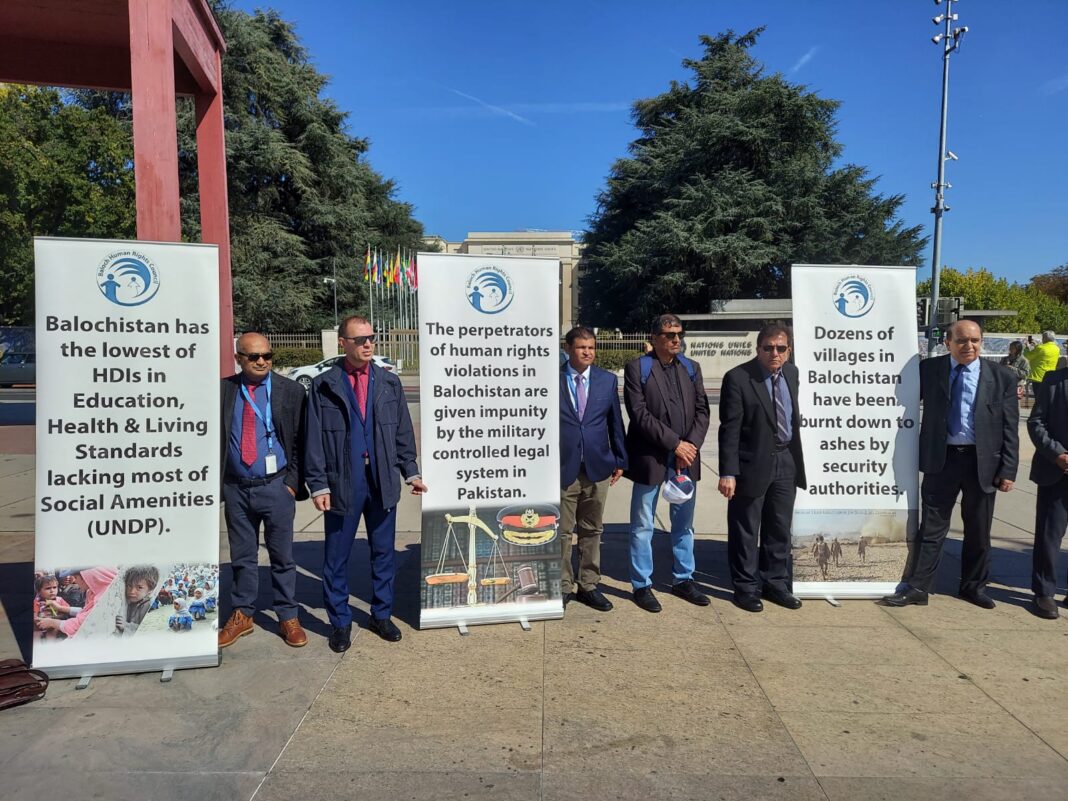The Baloch Human Rights Council (BHRC) organised a massive anti-Pakistan protest in front of the United Nations office in Geneva during the ongoing 51st session of the Human Rights Council. They called upon the UN to send a fact-finding mission to Balochistan to investigate heinous crimes being committed by Pakistan Army and other secret agencies. The demonstration was addressed by leaders of Baloch, Sindhis and Pakistan-occupied Kashmiri communities in exile and highlighted various aspects of human rights violations in Balochistan and termed them as genocide. The protesters later submitted a memorandum to the UN High Commissioner for Human Rights demanding to send a fact-finding mission to Balochistan to investigate extrajudicial killings and “kill and dump” policy of the Pakistani state.
Samad Baloch, Secretary General, Baloch Human Rights Council said, “We are gathered here to protest against barbarism and brutalities committed by Pakistan. To be honest, Pakistan is a curse upon Baloch, Sindhis and Pakhtun people since its creation and its annexation of Balochistan.” “Pakistan has made Balochistan a hell for Baloch people. They deliberately deprived the basic and fundamental rights of the Baloch people and we are here to raise the voices of the Baloch people and their grievances. We want the international community to intervene,” he added. Earlier, the Baloch human rights activists and those living in exile raised the issue of the grim human rights situation in Pakistan’s poorest but resource-rich province of Balochistan at a day-long conference held in Berlin on September 17.
They were joined by Sindhi, Pashtun, Uyghur and other human rights activists from Germany and other parts of Europe. They include Sindhi intellectuals and Secretary General of the World Sindhi Congress Dr. Lakho Luhana, President of World Uyghur Congress Dolkun Isa, Kurdish political leader Mako Qocgiri and Junior Joint Secretary of Baloch National Movement Hasan Dost Baloch. The chairman of the Baloch National Movement, Dr. Naseem, renowned scholar and author Dr. Ayisha Siddiqa, Historian Dr. Naseer Dasthi and Bibi Gul, the chairperson of the Human Rights Council of Balochistan also participated in the conference to make the world aware about worsening situation in Balochistan.
Dr. Naseem Baloch said that among the many issues the Baloch people face today under Pakistani occupation, the most compelling issue is the enforced disappearances and the kill and dump policy, including the recent fake encounters. He added, “in the recent sit-in protest in Shaal (Quetta) Balochistan, we saw sisters and mothers of the enforced disappeared persons with their infant children. We saw weak and ill children without shoes, their mothers holding them in one hand and holding a mic in the other hand; crying for their loved ones.” He also added: “We are indirectly fighting against China, the ally of Pakistan. We are fighting against its presence in Gwader. Our success means safeguarding the interests and way of life of many other minorities who are bound to fall prey to Chinese hegemony. Apart from the exploitation of our natural resources, the Chines presence on the Strait of Hormuz in Gwader Port is bound to have negative economic and military effects on this region and the world.”
“Earlier, Pakistan was alone in inflicting atrocities on us, the Baloch, the Gilgit and Baltistan, the Pashtuns and the Sindhis. but now it has got an expansionist and aggressive partner in the form of China. China has joined hands to carry on the Baloch Genocide. Their main purpose is to exploit the resources of Gilgit Baltistan, Sindh and Balochistan.” He said: “China has vast experience in exploitation and genocide from Tibet to East Turkestan, from Hongkong to Taiwan, China is a country that has no respect for human rights and humanity in its own country. More than two million Uyghur Muslims suffer in their concentration camps.” Dr. Naseem Baloch said, “Our national movement is a liberation movement from Pakistani occupation. We believe our liberation movement is an inspiration for the oppressed people of the entire region. Not only because we are fighting against Pakistan the centre of world terrorism but also we are fighting for the survival of cultural diversity, empowerment of nations and the rights of the oppressed ethnic minorities in the region.” In response to a participant’s question, he said that BNM wants to work with all Baloch political parties. We have also invited the central leaders of FBM and BRP for this program and we will continue to bridge for cooperation and solidarity in the future. He said that he is in close contact with other Baloch nationalist parties.

